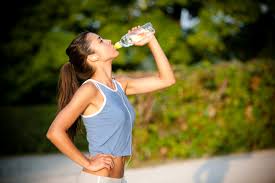Almost everyone knows the importance of drinking water after exercise. Physical exertion makes you sweat and lose water. Although sweating cools the body, you need to replace body fluids lost by drinking water so that your body's water balance is restored and the body does not overheat.

Why Should You Drink Water After Exercise?
Drinking water after workout has many health benefits, including:
1. Regulate Body Temperature
Water replenishment after exercise plays an important role in keeping normal body temperature. Water helps keep the body functioning well by lowering the body temperature to ensure it does not heat too much.
2. Prevent Muscle Cramps
Drinking water after workout helps prevent muscle cramps. Your muscles consist of up to 75 percent water, so after exercise, they may be dehydrated. It is therefore important to take enough water to help keep the muscle contraction normal and prevent cramps.
3. Avoid Water Retention
Drinking too little water makes the brain sense a threat to survival and it starts to store more water in your body. This results in swollen hands, legs, and feet.
4. Aid Weight Loss
Exercise makes you lose a lot of water and this makes the kidneys and liver malfunction. When you are dehydrated, the kidneys and liver cannot burn as much fat into energy, resulting in increased fat deposit. Drinking water after exercise can help prevent the increase in fat deposit and may therefore help you lose weight.
5. Assist Body Function
Your bodily fluids consist mostly of water, which helps in various functions such as digestion, nutrient absorption and transport, blood circulation, saliva production, etc. A lack of water in the body can lead to constipation, unhealthy cells and other conditions.
What Kind of Water Should You Drink?
Your body tends to absorb cool water faster than warm or lukewarm water. This is why most people drink cool water after exercise. However, ice-cold water is prohibited. Some studies suggest that ice-cold water may “shock” your digestive system since your body is quite warm after exercise. Some people experience stomach pain when drinking ice water after exercise.
Although drinking water after exercise is important, drinking juice such as tart cherry juice or an electrolyte solution such as a sports drink may also be beneficial. Just be sure to choose a beverage that contains minerals like sodium and not too much sugar.
How Much Water Should You Drink?
It’s not just a matter of drinking water after the exercise. You should also consider whether you are drinking enough or too much water. Ideally, you must take around 8 ounces (oz) or 250 ml of water within 30 minutes after exercise. And for every pound you lose, you must replace it with 16 to 20 oz of fluids.
It is also advisable to drink water before exercising to prevent dehydration. General guidelines indicate that drinking up to 20 oz (500-600 ml) of water 2-3 hours before exercising is a must. You must also take another 8 oz of fluids during your warm-ups (20-30 minutes before exercise), and 7-10 oz (200-300 ml) every 10-20 minutes during exercise.
These are just rough estimates. The amount of water you need to drink may vary according to your gender, age, height, weight, intensity of exercise, and duration of exercise. Try using CamelBak’s Hydration Calculator to learn how much water you need to drink.
Can You Drink Too Much Water After Exercise?
Although drinking water after exercise is the right thing to do, drinking too much of plain water can cause hyponatremia. What happens is that your blood becomes diluted from drinking too much water so your blood sodium level drops dangerously low. This is rare among healthy people but it sometimes happens to athletes like marathon runners who consume gallons of water during and after exercising.
Hyponatremia causes confusion, weakness, agitation, and seizures. In extreme cases, death can occur. Early symptoms of hyponatremia may include nausea, disorientation, and muscle cramps. These symptoms may also mimic symptoms of dehydration, making athletes drink even more water, thus worsening their condition. Hyponatremia is a medical emergency, and needs emergency care immediately. To prevent hyponatremia, always replace lost body fluids with electrolyte-containing beverages. Click here to find some great options.
